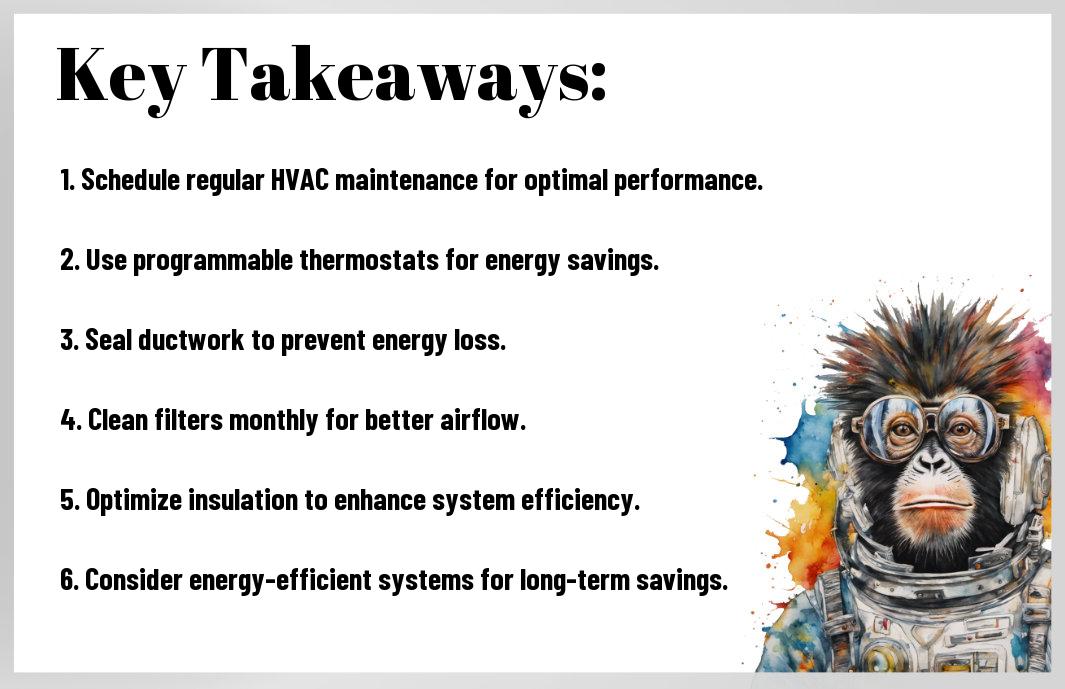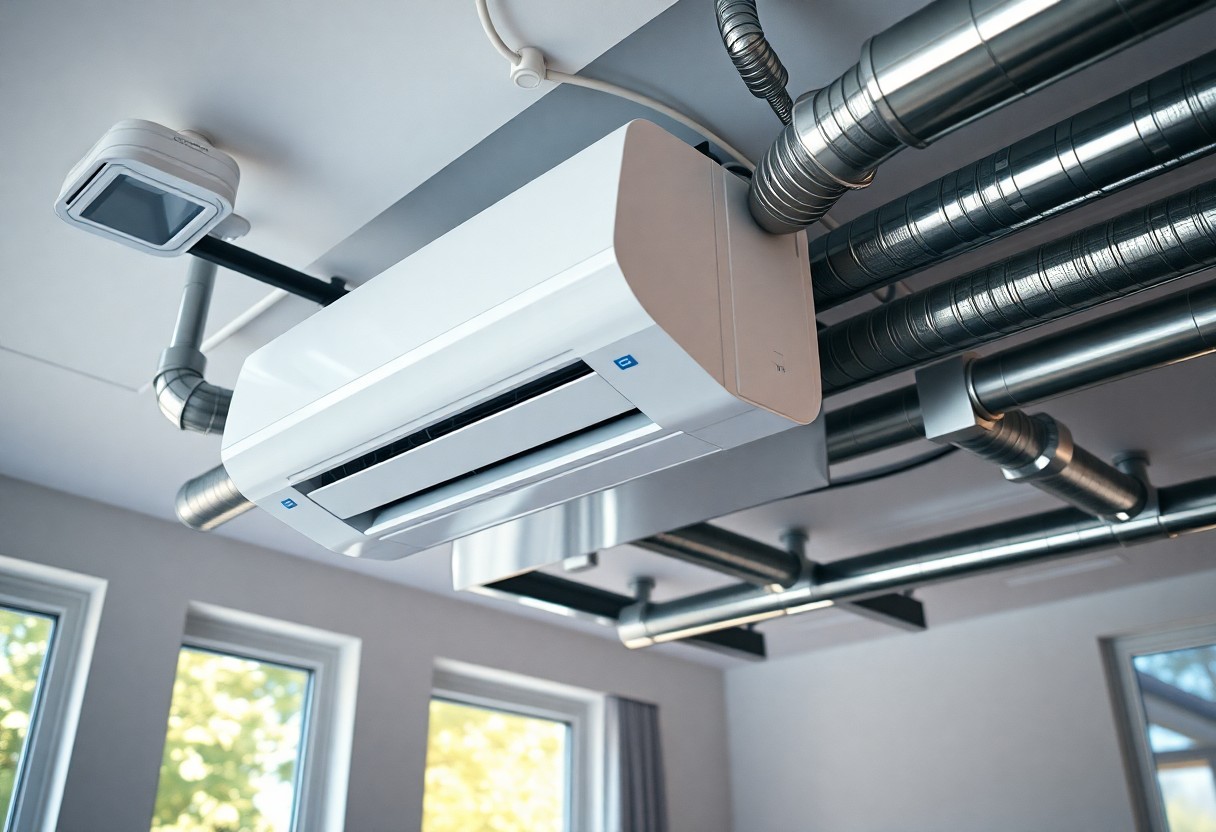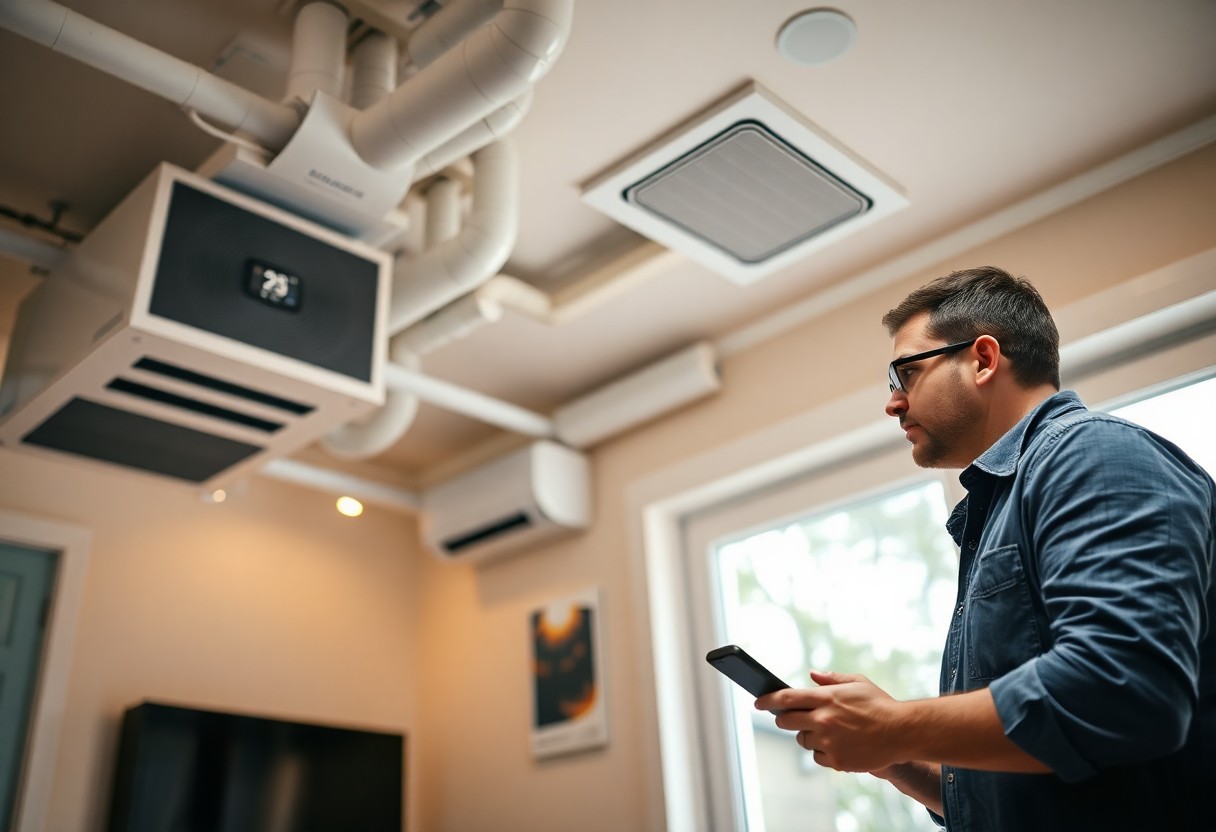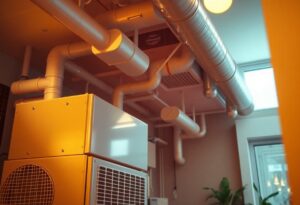HVAC: Unlock Best Tips for Efficient Heating, Ventilation & Cooling
You hold the key to optimizing your home’s heating, ventilation, and cooling systems. By implementing efficient HVAC strategies, you can not only enhance your indoor comfort but also lower your energy bills. Regular maintenance, proper insulation, and the use of smart thermostats are just a few ways you can ensure your systems operate at peak efficiency. This guide will provide you with actionable tips that empower you to take control and improve your home’s climate management while prioritizing safety and performance.
Key Takeaways:
- Regular maintenance of HVAC systems can enhance efficiency and extend their lifespan.
- Proper insulation and sealing of windows and doors can significantly reduce heating and cooling costs.
- Installing programmable thermostats helps optimize energy usage and maintain comfortable indoor temperatures.
- Periodic cleaning or replacing of air filters ensures improved air quality and system performance.
- Utilizing ceiling fans can aid in circulation, making it easier to maintain the desired temperature in a room.
- Energy-efficient appliances and systems that have a higher SEER or AFUE rating are considered for better performance.
- Strategic landscaping, such as planting trees for shade, can reduce the demand on HVAC units during extreme temperatures.
Understanding HVAC Systems
The effectiveness of heating, ventilation, and air conditioning (HVAC) systems greatly influences your home’s comfort and energy efficiency. These systems work together to provide a balanced indoor environment by regulating temperature, humidity, and air quality. By understanding the intricacies of HVAC systems, you can make informed decisions that enhance your home’s comfort while reducing energy consumption.
Components of HVAC
One of the primary elements of any HVAC system is the heating components, which can range from furnaces and boilers to heat pumps. These systems convert energy sources, such as electricity or gas, into heat for your living space. Cooling components, like air conditioners and chillers, work on the opposite principle, removing heat from the air to lower temperatures and improve comfort during warmer months.
Additionally, the ventilation aspect focuses on exchanging or replacing air within the spaces of your home to provide fresh air and maintain air quality. This encompasses exhaust fans, air ducts, and air filters, all of which are important for maintaining a healthy indoor environment. Understanding these components will allow you to evaluate your system’s efficiency and consider upgrades or maintenance as necessary.
Importance of Efficiency
On a broader scale, the efficiency of your HVAC system directly affects your energy bills and environmental impact. An efficient system utilizes less energy for the same level of comfort, ultimately saving you money. Furthermore, an inefficient HVAC system tends to work harder, leading to increased wear and tear on the components, which can result in costly repairs or premature replacements.
Further, maintaining efficiency in your HVAC system is not just about saving money; it also reduces your carbon footprint. By ensuring that your system is operating at optimal levels, you are helping to decrease greenhouse gas emissions associated with energy production. Regular maintenance, such as changing filters, checking for leaks, and ensuring that your system is correctly sized for your living space, can lead to significant benefits. Investing in energy-efficient systems or upgrading existing units can maximize comfort in your home while contributing positively to the environment. This level of efficiency not only enhances your immediate living conditions but also plays a significant role in promoting sustainability for future generations.
Tips for Efficient Heating
Any homeowner looking to enhance their heating efficiency should consider several key strategies. By optimizing your approach, you can maintain a comfortable environment while reducing energy costs. Here are some tips to help you achieve this:
- Regularly service your heating system to ensure it’s operating at peak performance.
- Seal any drafts around windows and doors to prevent heat loss.
- Utilize energy-efficient heating systems tailored for your home.
- Invest in a programmable thermostat to better manage heating schedules.
- Consider upgrading to more efficient insulation materials.
This proactive approach will not only enhance your home’s warming efficiency but also contribute to lower energy bills.
Proper Insulation
Among the most effective ways to achieve efficient heating in your home is through proper insulation. Ensuring that your walls, attics, and floors are well-insulated prevents heat from escaping, keeping your home warm and comfortable. You should invest in quality insulation materials such as spray foam, fiberglass, or cellulose to minimize energy loss and maximize your heating system’s efficiency.
A noticeable difference can be made by checking insulation levels and upgrading where necessary. Proper insulation is a long-term investment that not only saves you money on utility bills but also lessens the environmental impact of your heating needs. This means that by taking the time to evaluate and enhance your insulation, you can enjoy a more sustainable and efficient home environment.
Thermostat Management
About managing your thermostat effectively can lead to significant energy savings and a more comfortable living space. Adjusting your thermostat settings according to your routine can drastically reduce unnecessary energy consumption. For instance, lowering the temperature while you’re away or sleeping can help you save on heating costs without sacrificing comfort.
Further, utilizing a programmable or smart thermostat allows you to customize heating schedules based on your personal routine, ensuring that your home is warm when you need it and cooler during the times you don’t. This smart technology not only saves you money but also reduces your carbon footprint. By setting your thermostat correctly and utilizing its features, you are actively contributing to a more efficient and sustainable atmosphere in your home.
Tips for Efficient Ventilation
Many homeowners underestimate the significance of effective ventilation in maintaining a comfortable living environment. Ensuring that your home has proper airflow can positively impact both your health and energy efficiency. To maximize your ventilation efforts, consider the following actionable tips:
- Regularly clean and replace air filters to enhance air quality.
- Utilize exhaust fans, particularly in areas like kitchens and bathrooms, to expel unwanted moisture and odors.
- Incorporate energy recovery ventilators (ERVs) or heat recovery ventilators (HRVs) to improve indoor air circulation while minimizing energy loss.
- Seal any leaks in ductwork to prevent the loss of conditioned air.
- Maintain your HVAC system to ensure optimal performance.
Perceiving the changes brought about by these steps can lead to noticeable improvements in your home’s air quality and overall comfort. Efficient ventilation not only controls indoor temperatures but also reduces the risk of mold and allergens, creating a healthier living space.
Air Quality Maintenance
Along with proper ventilation, maintaining excellent air quality is important for your well-being. Regularly monitoring indoor pollutants such as dust, mold, and volatile organic compounds (VOCs) can help you create a healthier environment. Investing in air purifiers with HEPA filters can significantly reduce allergens in your home.
Additionally, keeping indoor plants can naturally improve air quality while enriching your surroundings. You could also minimize the use of chemical-laden cleaning products and opt for eco-friendly alternatives. This approach aids in reducing indoor air contaminants and, in turn, enhances the efficiency of your ventilation system.
Ventilation Strategies
About implementing effective ventilation strategies, understanding how air flows in your home can make a significant difference. Aim for a continuous exchange of stale indoor air with fresh outdoor air to avoid air stagnation. Incorporate natural ventilation methods, like opening windows on pleasant days, along with mechanical systems for enhanced control.
Consequently, harnessing techniques such as creating cross-ventilation by positioning vents on opposite sides of your home can encourage effective airflow. Utilizing ceiling fans can aid in redistributing the air and promoting even temperatures throughout the space. Actively engaging with both natural and mechanical methods increases your home’s energy efficiency while fostering a healthier atmosphere.
Tips for Efficient Cooling
Your journey toward an efficient cooling system starts now. Implementing effective strategies can significantly enhance the comfort in your home while minimizing energy consumption. Consider the following tips to optimize your cooling efficiency:
- Keep windows and doors closed when the air conditioner is running to prevent warm air from entering.
- Utilize ceiling fans to circulate cool air efficiently throughout the room.
- Set your thermostat a few degrees higher to save energy while still staying comfortable.
- Install window treatments such as shades or blinds to block out direct sunlight during the hottest part of the day.
- Consider utilizing programmable thermostats to adjust cooling based on your schedule.
Perceiving the value of these steps will help you create a more energy-efficient cooling environment. By being proactive about these simple adjustments, you’re likely to notice a positive impact on your energy bills and overall comfort levels.
Choosing the Right AC Unit
Across various models and brands, selecting the right air conditioning unit is imperative for maximizing cooling efficiency. Determine the size of the space that needs to be cooled and choose an AC unit that matches these requirements. An oversized air conditioner will cool your home too quickly, leading to high humidity levels, while an undersized unit will struggle to keep up, using more energy than necessary. Additionally, look for units with a high Seasonal Energy Efficiency Ratio (SEER), as these units use less energy to cool effectively.
When exploring options, energy-efficient options such as ductless mini-splits or central air systems can offer substantial advantages. You should also consider features like a variable-speed compressor, which can operate at different speeds depending on the cooling load, further enhancing the energy efficiency of your cooling system.
Routine Maintenance Practices
For optimal cooling performance, regular maintenance is integral to the lifespan and efficacy of your AC unit. Schedule annual professional inspections, which can identify potential issues before they become costly repairs. In addition, you can maintain efficiency through simple habits such as cleaning or replacing filters every month during the cooling season and ensuring that the exterior coils are clear of debris and dirt.
Efficient maintenance practices not only enhance your air conditioner’s performance but also ensure a healthier indoor environment. Regularly cleaning air filters can significantly improve air quality, reducing allergens and pollutants in the air. Neglecting routine checks may lead to the buildup of mold, which can compromise both the system’s performance and your health. Prioritize these practices to enjoy a well-functioning cooling system that meets your needs all summer long.
Energy-Saving Practices
Now is the ideal time to embrace energy-saving practices that not only lower your utility bills but also contribute to a more sustainable environment. By making a few adjustments in how you use your heating, ventilation, and air conditioning (HVAC) systems, you can achieve significant energy savings. Simple habits such as regularly replacing your air filters and ensuring proper insulation can dramatically enhance your system’s efficiency. Each of these steps allows your HVAC system to operate effectively, reducing both energy consumption and wear-and-tear over time.
Utilizing Smart Technology
An effective strategy to optimize your energy consumption is through the implementation of smart technology. Smart thermostats, for instance, can learn your schedule and adjust the temperature accordingly, which minimizes energy waste during times when you are away from home. By integrating smart technology, you can also monitor and control your HVAC system remotely, allowing you to make on-the-fly adjustments even when you’re not around. This smart approach ensures that your home remains comfortable while consuming less energy.
Seasonal Adjustments
Against a backdrop of changing seasons, it’s crucial to adapt your HVAC settings to maintain efficient energy use throughout the year. Your system’s performance can greatly improve when you adjust thermostat settings seasonally; for example, setting the thermostat a few degrees higher in the summer and lower in the winter can yield substantial savings. In addition, insulating your home and sealing any gaps in doors or windows helps retain desired indoor temperatures without overworking your system.
Also, conducting a seasonal checkup of your HVAC system is beneficial. This includes scheduling regular professional maintenance, which can help identify inefficiencies before they escalate. Such preventative measures not only enhance performance but also prolong the lifespan of your HVAC system, reducing the likelihood of expensive repairs. Implementing seasonal adjustments is a responsible choice that positively impacts both your wallet and the environment.
Common HVAC Myths
Unlike what many people believe, maintaining your heating, ventilation, and cooling system is not just about changing filters and occasionally checking the thermostat. There are numerous misconceptions that can lead to improper operation and inefficiency. For instance, some homeowners think that a larger HVAC system will offer better cooling and heating, but in reality, over-sized units can lead to increased energy costs and inadequate humidity control. Understanding these myths is important for you to maximize your HVAC system’s efficiency and longevity.
Debunking Misconceptions
For many, the idea that turning your thermostat up in winter and down in summer can save energy is a common misconception. In actuality, your system works hardest to return to the set temperature after large fluctuations, which could lead to higher energy bills. Another common myth is that sealing off vents in unused rooms will improve efficiency; however, this can disrupt the balance of the system, causing it to work harder and potentially shortening its lifespan.
Recognizing Facts
To help debunk these myths, it’s important to focus on actual HVAC facts. Regular maintenance, including annual inspections and cleaning, can significantly enhance your system’s performance and efficiency. Additionally, using programmable thermostats allows you to optimize usage without the need for temperature extremes. Understanding the true capabilities of your HVAC system can empower you to make informed decisions that could lead to better energy savings and improved comfort.
Further exploring these facts, you will discover that investing in energy-efficient HVAC systems is more beneficial than just immediate savings. They often come with advanced technology that can optimize your home environment while providing reliable performance. Moreover, implementing practices like regular filter changes not only improves air quality but also plays a significant role in your system’s operating at peak efficiency. Adopting these techniques will help you create a more pleasant indoor atmosphere while reducing energy costs.
Conclusion
Following this guide, you are equipped with a variety of the best tips to enhance the efficiency of your heating, ventilation, and cooling systems. By implementing these strategies, you can ensure that your home maintains a comfortable atmosphere throughout the seasons while also conserving energy and reducing utility costs. Regular maintenance, thoughtful installation, and the use of smart technology will significantly contribute to optimum performance, allowing you to take control of your indoor climate effectively.
Furthermore, staying informed about the latest advancements in HVAC technology and practices will empower you to make informed decisions moving forward. By prioritizing efficiency and actively managing your system’s performance, you can create a more sustainable and enjoyable living environment. Embrace these tips and invest in your comfort and well-being for years to come.
FAQ
Q: What are the basic principles of efficient heating, ventilation, and cooling (HVAC)?
A: Efficient HVAC systems operate on the principles of thermodynamics and airflow dynamics. Heating and cooling should be balanced to maintain a comfortable indoor temperature. Proper ventilation must ensure fresh air circulation while filtering out contaminants. Regular maintenance and appropriate sizing of HVAC equipment are also necessary for optimal performance.
Q: How often should I maintain my HVAC system for the best efficiency?
A: It is recommended to conduct regular maintenance at least twice a year—once in the spring for the cooling system and once in the fall for the heating system. Routine checks can include replacing or cleaning filters, checking refrigerant levels, inspecting ductwork for leaks, and ensuring vents are unobstructed for optimal airflow.
Q: What factors should I consider when choosing an HVAC system for my home?
A: When deciding on an HVAC system, consider the size of your home, energy efficiency ratings (like SEER for cooling and AFUE for heating), climate, noise levels, and your budget. Investing in an energy-efficient system may lead to lower utility bills over time. Additionally, assess your home’s insulation and ductwork, as they impact overall heating and cooling effectiveness.
Q: How can I improve ventilation without compromising energy efficiency?
A: You can enhance ventilation by using energy recovery ventilators (ERVs) or heat recovery ventilators (HRVs). These systems exchange stale indoor air with fresh outdoor air while minimizing energy loss. Also, ensure that bathroom and kitchen exhaust fans are functioning properly to eliminate excess moisture and odors.
Q: What role does insulation play in HVAC efficiency?
A: Insulation is vital for minimizing heat transfer between your home and the outdoor environment. Properly insulated walls, attics, and basements reduce the workload on HVAC systems, as they help maintain desired indoor temperatures. Investing in high-quality insulation can lead to significant energy savings year-round.
Q: Are smart thermostats worth the investment for HVAC efficiency?
A: Yes, smart thermostats can significantly enhance HVAC efficiency by learning your schedule and preferences. They can optimize heating and cooling cycles, adjusting temperatures when you’re away or asleep. Many models can be controlled remotely via smartphone apps, allowing for convenient adjustments and improved energy management.
Q: What common mistakes should I avoid to maintain HVAC efficiency?
A: Some common mistakes include neglecting regular maintenance, ignoring air filter replacements, blocking vents and air registers, setting the thermostat too high or too low, and failing to seal ductwork properly. Avoiding these issues will help ensure your HVAC system operates efficiently and effectively throughout the year.
This post has been written by Team HVAC Talk Magazine. Stay informed and connected with the latest in HVAC—join us for expert advice, troubleshooting tips, and news updates. Don’t miss out; follow us now! #HVACExperts #HVACTips #StayInformed #HVACProTalk.
Learn more and join our mailing list for updates.




